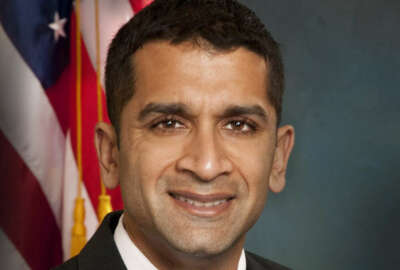GAO has recommendations to safeguard integrity of federal R&D grants
After looking at policies for agencies representing 90% of federal research and development grants, the Government Accountability Office has a few recommendations.
Best listening experience is on Chrome, Firefox or Safari. Subscribe to Federal Drive’s daily audio interviews on Apple Podcasts or PodcastOne.
When it comes to federally funded research, the grantees can have conflicts of interest that are non-financial. Like employment by another institution, or worse, some tie to a foreign government that may try to influence research outcomes. After looking at policies for agencies representing 90% of federal research and development grants, the Government Accountability Office has a few recommendations. For highlights, Federal Drive with Tom Temin turned to the GAO’s director of science, technology assessment and analytics, Candice Wright.
Interview transcript:
Tom Temin: Ms. Wright, good to have you back.
Candice Wright: Thanks for having me again, Tom.
Tom Temin: And first of all, let’s talk about the agencies you looked at, these give out billions of dollars in grants every year — correct?
Candice Wright: Certainly. We looked at the five largest grant making agencies, which includes the Departments of Defense and Energy, as well as the National Science Foundation, National Institutes of Health, as well as NASA.
Tom Temin: And they all have some way of getting grantees to certify that they have no financial conflicts of interests — is that correct?
Candice Wright: Generally speaking, there has been greater emphasis over the years on looking at financial conflicts. However, given recent developments with law enforcement and intelligence agencies warning about certain risks to research security, there’s a greater need to look not just to financial conflicts, but also non-financial conflicts. And so what we found in our work is that NSF, NIH, and NASA all have agency wide policies for addressing financial conflicts of interest, but where we didn’t see as much emphasis is in their policies was on defining what are non financial conflicts of interest, and so that led to our recommendation. In addition, we also found that DoD and Department of Energy did not have agency-wide conflict of interest policies, there were certainly some components within those agencies that had policies, but again, it wasn’t something at the agency level, which we think is really important to ensure that there’s uniformity and consistency across the agencies.
Tom Temin: That’s a good point, because if you’re talking about the Defense Department or Energy, they have so many channels and so many grant making bureaus and agencies that often the left hand may not know how the right hand does it.
Candice Wright: Right. And it also creates confusion for the researchers who are receiving grants and might have different processes and requirements that they have to follow within just one agency, let alone across the various agencies that they may be getting grant funding from.
Tom Temin: And with respect to financial conflict of interest, which they are better at getting at, what forms does that take in general, what forms could it take?
Candice Wright: So financial conflicts might include things like getting salaries or consulting fees or perhaps even stock options, maybe any agreements to have intellectual property rights, i.e. patents or copyrights, for example, those are some of the kinds of things that should be disclosed in terms of any financial conflicts that could create undue influence in the conduct and design of the research.
Tom Temin: In other words, if I’m looking at something in the car industry, and I have Ford, GM and Toyota stock in large quantity, that would be a financial conflict of interest.
Candice Wright: Potentially. I would just also add that it’s important to note that simply having these financial benefits may not in and of itself be something nefarious, right, or it may not in and of itself be a bad thing, but it’s important to disclose that so that folks who are reviewing these grants can have the information they need to determine if there are potential concerns and potential risks and be able to put a plan in place to mitigate against those risks.
Tom Temin: In other words, the sunshine aspect of it.
Candice Wright: Correct.
Tom Temin: We’re speaking with Candice Wright. She’s director of science, technology assessment and analytics at the Government Accountability Office. And what form can non financial conflicts of interest take?
Candice Wright: So these can really vary in terms of having other agreements to conduct research for another entity, it might also include having different kinds of appointments to conduct certain research that might include affiliations with other entities or just getting other kinds of support. And so we think it’s really important in those instances. Again, those things in and of themselves do not constitute a risk, but it’s important to disclose that information so that folks can assess the potential for risk and make the appropriate decision.
Tom Temin: Because the report mentions in the title and in the preface to the whole thing, the idea of foreign influence. So foreign conflict of interest could be saying getting a grant from another government for example, or what forms could that take?
Candice Wright: One of the things that’s really become a great concern over the past few years, are what are known as foreign government talent recruitment programs. These are things that have existed for years, and they can often be seen as very prestigious for a researcher to be invited to be part of these programs. However, these kinds of programs and it has come to others attention, that they sometimes can obligate the researcher to participate in these programs in exchange for getting access to information about US funded research. And so they may obligate them to divert information about the research funded by US taxpayers in exchange for getting salaries or lab equipment or other kinds of incentives.
Tom Temin: And that’s actually happened in several instances — hasn’t it?
Candice Wright: There certainly have been instances of cases that have been prosecuted where individuals did either fail to disclose their involvement in such programs, or were found to be providing information sensitive information about US research.
Tom Temin: Alright, and let’s get to the recommendations, then.
Candice Wright: Certainly. So we made recommendations to the five agencies that I mentioned earlier, as well as the Office of Science and Technology Policy. And a couple of there that we thought were really important is to make sure that the agencies are taking the necessary steps to strengthen the policies that they already have in place. And so we recommended that NIH, NSF and NASA update their conflict of interest policies to explicitly address and define non financial conflicts, because again, you want to take the guess work out of the researchers having to try to understand what they should or shouldn’t be disclosing. And so I think it’s an important step to strengthen the policies by defining these non financial conflicts of interest. And then for the Department of Defense and Energy, we made a recommendation that they needed department wide conflict of interest policies, so that it’s not just at the component level, but to ensure that there’s uniformity across the department. For OSTP, we had made a recommendation that they needed to provide detailed guidance, again, addressing these issues with regard to strengthening policies, and providing the university research community with information about conflicts of interest and disclosure requirements. For their part, there was guidance that came out earlier this year, however, it was at a very high level. And we’ve since learned that there are now plans to provide implementing guidance to even further strengthen what was already released. And so that implementation guidance is going to be due November 2021.
Tom Temin: Got it. And when you add all of this up, it seems like a fairly important piece of housekeeping given how much the government spends on grants every year, $600-700 billion.
Candice Wright: I think from the work that we’ve done, we’ve seen that R&D expenditures can be about $40 billion annually. So certainly that’s a lot of money at stake here. And it’s really important to ensure that given these risks, while there’s a desire to ensure that there’s open science, because science often progresses through scientists sharing information, collaborating, however, there are certainly these risks. And so we’re saying, take some of these steps to more clearly articulate for the research community, what the nature of the threats are, what the extent of the threats are, and then strengthening the tools that can be used to help address and or mitigate these challenges.
Tom Temin: Anything else we need to know?
Candice Wright: Well, you know Tom, I would just say that, as we’ve seen with many scientific breakthroughs and technological advancement, it really takes a village. And oftentimes it takes a global village that’s collaborating on research. And so really to try to address this issue of how do you balance open science and collaboration with security, it will be very important to ensure that everyone in the village has shared goals, interests and values, to really make sure that we’re addressing the challenges
Tom Temin: And the agencies generally agreed with you.
Candice Wright: Yes, the agencies did concur, and we understand that they are taking various steps to address the recommendations. They have not yet been fully addressed, and so we’ll continue to monitor to see where they are in the dressing recommendations.
Tom Temin: Candice Wright is director of science technology assessment and analytics at the Government Accountability Office. Thanks so much for joining me.
Candice Wright: Thanks for having me, Tom. It’s my pleasure.
Copyright © 2025 Federal News Network. All rights reserved. This website is not intended for users located within the European Economic Area.
Tom Temin is host of the Federal Drive and has been providing insight on federal technology and management issues for more than 30 years.
Follow @tteminWFED






